Foreign
Hezbollah Vows To Keep Fighting Israel After Nasrallah Killing
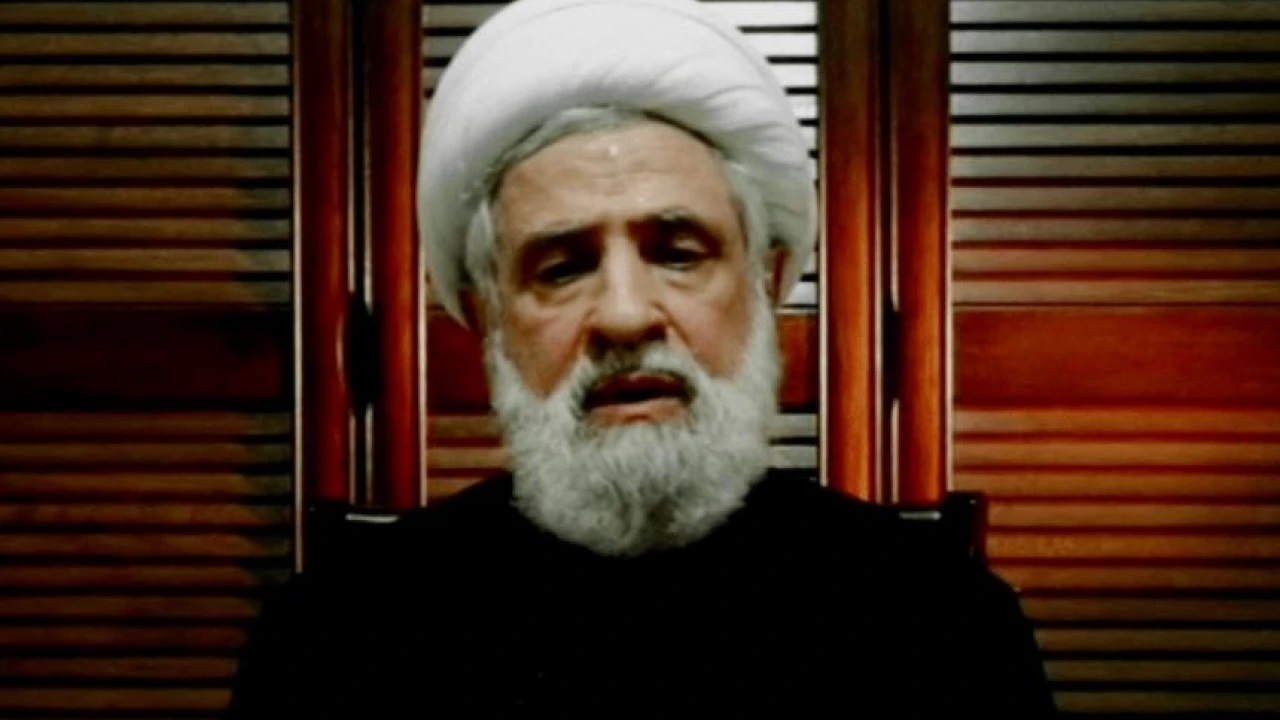
Hezbollah vowed on Monday to keep fighting Israel and said it was ready to face any ground operation into Lebanon, after its leader was killed in an air strike that dealt the group a seismic blow.
In a televised address, the Iran-backed group’s deputy chief Naim Qassem said a new leader to replace Hassan Nasrallah, who enjoyed cult status among his supporters, would be selected “at the earliest opportunity”.
He also said the group was ready for any Israeli ground offensive, even though Israel’s bombardment of its strongholds has in the past week killed a large number of its top commanders and officials.
Hezbollah began low-intensity cross-border strikes on Israeli troops a day after its Palestinian ally Hamas staged its unprecedented attack on Israel on October 7, triggering war in the Gaza Strip.
Israel said earlier this month that it was shifting its focus from Gaza to securing its northern border with Lebanon, in order to allow Israelis displaced since October to return to their homes.
It has also not ruled out a ground offensive in order to achieve its goals.
Israel’s strikes on Lebanon have killed hundreds and forced hundreds of thousands more to flee their homes, and left people across the region fearful of more violence to come.
Qassem said Hezbollah would continue “confronting the Israeli enemy in support of Gaza and Palestine, in defence of Lebanon and its people, and in response to the assassinations and the killing of civilians”.
Warning that any battle with Israel would be long, he said: “We will face any scenario and we are ready if Israel decides to enter by land, the resistance forces are ready for any ground confrontation.”
On the other side of the border, Israel’s Defence Minister Yoav Gallant told troops: “The elimination of Nasrallah is an important step, but it is not the final one.”
“In order to ensure the return of Israel’s northern communities, we will employ all of our capabilities, and this includes you,” he said.
– Beirut strike –
Most of Israel’s strikes have targeted Hezbollah strongholds in eastern and southern Lebanon and the southern suburbs of Beirut, the group’s main bastion.
On Monday, a drone strike hit a building in the Cola district in central Beirut, with an armed Palestinian group saying it had killed three of its members.
The strike, the first in the centre of the city in years, sparked panic, with 41-year-old resident Mohammed al-Hoss saying “the kids were in shock” after his house was damaged.
“We are with Gaza and support the Palestinian cause, but our country cannot cope with us going to war,” he said.
“Our country is in a wretched state. They (Israel) finished with Gaza and they have come to Lebanon.”
Lebanon’s health ministry also reported the strike, saying it had killed four people and wounded four others. Israel has yet to comment.
Palestinian Islamist group Hamas later announced that its leader in Lebanon, Fatah Sharif Abu al-Amine, had been killed along with his wife and two children in another strike on Al-Bass refugee camp in south Lebanon.
The Israeli military confirmed it had “eliminated” Sharif in a strike.
Lebanon’s health ministry said six rescuers affiliated with Hezbollah were killed in an Israeli strike Monday.
Around Lebanon, Israeli strikes killed more than 100 people on Sunday, including 45 near the southern city of Sidon, according to the ministry.
Lebanon’s Health Minister Firass Abiad said Saturday that 1,030 people including 87 children had been killed since September 16.
UN refugee agency chief Filippo Grandi said “well over 200,000 people are displaced inside Lebanon”, while more than 100,000 have fled to neighbouring Syria.
Prime Minister Najib Mikati said up to one million people may have been uprooted, in potentially the “largest displacement movement” in Lebanon’s history.
– Yemen strikes –
The violence in Lebanon has raised fears of a much wider conflagration in the region.
On Monday, the Israeli army said it “successfully intercepted a suspicious aerial target that crossed from Lebanon into Israeli territory”.
Israel said it also carried out strikes on Sunday targeting Iran-backed Huthis in Yemen that the rebels said killed four people and wounded 33.
The raids in Yemen came a day after the Huthis said they launched a missile at Israel’s Ben Gurion airport, trying to hit it as Prime Minister Benjamin Netanyahu was returning from New York.
Iran has said Nasrallah’s killing would bring about Israel’s “destruction”, though the foreign ministry said Monday it would not deploy any fighters to confront Israel.
Lebanon began a three-day national mourning period for Nasrallah on Monday, with flags flying at half-mast.
In Israel, some had mixed feelings about the Hezbollah chief’s killing.
“Nasrallah was responsible for the deaths of many Israelis, so it is good news,” said Matan Sofer, 24, in the northern town of Rosh Pina.
“But do we risk it getting worse, who knows?”
– Calls for halt –
World leaders have called for a de-escalation.
French Foreign Minister Jean-Noel Barrot met with the Lebanese premier in Beirut Monday, and said his government sought “an immediate halt” in the strikes.
He is the first high-level foreign diplomat to visit since the Israeli strikes intensified.
US President Joe Biden, whose government is Israel’s top arms supplier, said Sunday a wider war “really has to be avoided”.
In Gaza, AFP journalists said the number of air strikes across the territory has dropped significantly in recent days.
Hamas’s unprecedented October 7 attack on Israel resulted in the deaths of 1,205 people, mostly civilians, according to an AFP tally based on Israeli official figures that include hostages killed in captivity.
Israel’s retaliatory military offensive has killed at least 41,615 people in Gaza, most of them civilians, according to figures provided by the Hamas-run territory’s health ministry. The UN has described the figures as reliable.
Foreign
Massive explosion at Iran port kills at least 14 people, injures 750
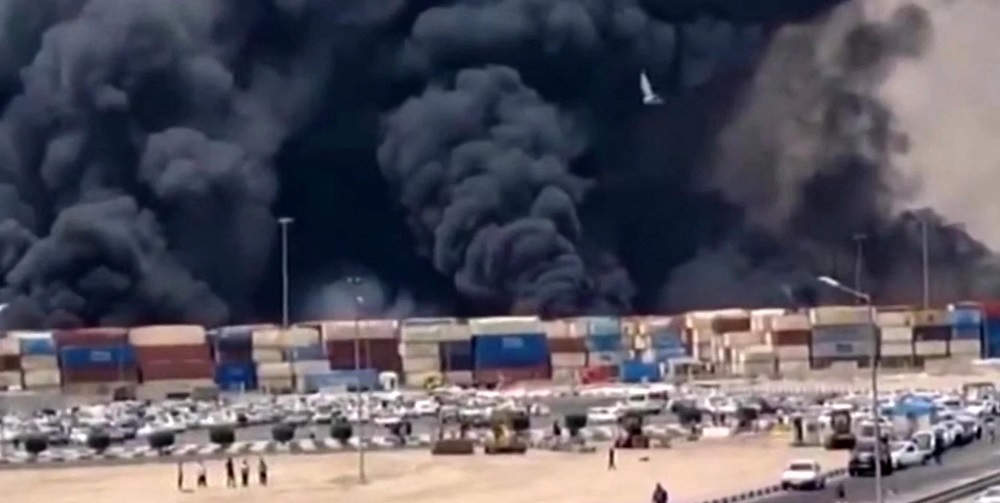
A massive explosion and fire rocked a port Saturday in southern Iran purportedly linked to a shipment of a chemical ingredient used to make missile propellant, killing 14 people and injuring around 750 others.
Helicopters and aircraft dumped water from the air on the raging fire through the night into Sunday morning at the Shahid Rajaei port. The explosion occurred just as Iran and the United States met Saturday in Oman for the third round of negotiations over Tehran’s rapidly advancing nuclear program.
No one in Iran outright suggested that the explosion came from an attack. However, even Iranian Foreign Minister Abbas Araghchi, who led the talks, on Wednesday acknowledged that “our security services are on high alert given past instances of attempted sabotage and assassination operations designed to provoke a legitimate response.”
State media offered the casualty figures. But there were few details on what sparked the blaze just outside of Bandar Abbas, causing other containers to reportedly explode.
Security firm says port received chemical for missile fuel
The port took in a shipment of the missile fuel chemical in March, the private security firm Ambrey said. The fuel is part of a shipment of ammonium perchlorate from China by two vessels to Iran first reported in January by the Financial Times. The chemical used to make solid propellant for rockets was going to be used to replenish Iran’s missile stocks, which had been depleted by its direct attacks on Israel during the war with Hamas in the Gaza Strip.
“The fire was reportedly the result of improper handling of a shipment of solid fuel intended for use in Iranian ballistic missiles,” Ambrey said.
Ship-tracking data analyzed by The Associated Press put one of the vessels believed to be carrying the chemical in the vicinity in March, as Ambrey said. Iran hasn’t acknowledged taking the shipment. The Iranian mission to the United Nations didn’t respond to a request for comment on Saturday.
It’s unclear why Iran wouldn’t have moved the chemicals from the port, particularly after the Beirut port blast in 2020. That explosion, caused by the ignition of hundreds of tons of highly explosive ammonium nitrate, killed more than 200 people and injured more than 6,000 others. However, Israel did target Iranian missile sites where Tehran uses industrial mixers to create solid fuel.
Social media footage of the explosion on Saturday at Shahid Rajaei saw reddish-hued smoke rising from the fire just before the detonation. That suggests a chemical compound being involved in the blast — like in the Beirut explosion.
“Get back get back! Tell the gas (truck) to go!” a man in one video shouted just before the blast. “Tell him to go, it’s going to blow up! Oh God, this is blowing up! Everybody evacuate! Get back! Get back!”
On Saturday night, the state-run IRNA news agency said that the Customs Administration of Iran blamed a “stockpile of hazardous goods and chemical materials stored in the port area” for the blast, without elaborating.
An aerial shot released by Iranian media after the blast showed fires burning at multiple locations in the port, with authorities later warning about air pollution from chemicals such as ammonia, sulfur dioxide and nitrogen dioxide in the air. Schools and offices in Bandar Abbas will be closed Sunday as well.
Port a major destination for Iranian cargo
Shahid Rajaei has been a target before. A 2020 cyberattack attributed to Israel targeted the port. It came after Israel said that it thwarted a cyberattack targeting its water infrastructure, which it attributed to Iran. Israeli officials didn’t respond to requests for comment regarding Saturday’s explosion.
Social media videos showed black billowing smoke after the blast. Others showed glass blown out of buildings kilometers, or miles, away from the epicenter of the explosion. State media footage showed the injured crowding into at least one hospital, with ambulances arriving as medics rushed one person by on a stretcher.
Hasanzadeh, the provincial disaster management official, earlier told state television that the blast came from containers at Shahid Rajaei port in the city, without elaborating. State television also reported that there had been a building collapse caused by the explosion, though no further details were offered.
The Interior Ministry said that it launched an investigation into the blast. Iranian President Masoud Pezeshkian also offered his condolences for those affected in the blast.
Shahid Rajaei port in Hormozgan province is about 1,050 kilometers (650 miles) southeast of Iran’s capital, Tehran, on the Strait of Hormuz, the narrow mouth of the Persian Gulf through which 20% of all oil traded passes.
Foreign
Judge halts Trump’s shutdown of Voice of America

A federal judge has ordered the Trump administration to restore all jobs and funding for the Voice of America and other US-backed news outlets, ruling that efforts to dismantle it violated the law and Constitution.
Over 1,300 VOA employees, including about 1,000 journalists, were placed on leave following President Donald Trump’s order. The White House has accused the broadcaster of being “anti-Trump” and “radical”.
VOA, still primarily a radio service, was set up during World War II to counter Nazi propaganda, and has become a major global media broadcaster.
The ruling noted that because of the cuts, “VOA is not reporting the news for the first time in its 80-year existence”.
Judge Royce Lamberth said the administration acted “without regard to the harm inflicted on employees, contractors, journalists, and media consumers around the world”.
He ordered the administration to take steps to restore employees and contractors to the jobs they had prior to the executive order, and to do the same for Radio Free Asia and the Middle East Broadcasting Networks.
The judge found the administration also likely violated the International Broadcasting Act and Congress’ power to appropriate funding.
“My colleagues and I are grateful for this ruling. But we know that this is just a small step forward, as the government is likely to appeal,” said Patsy Widakuswara, the VOA White House bureau chief and a lead plaintiff in the lawsuit.
“We are committed to continuing to fight against what we believe is the administration’s unlawful silencing of VOA until we can return to our congressional mandate: to tell America’s stories with factual, balanced, and comprehensive, reporting,” she said.
Trump has long criticised VOA as part of his broader attacks against the media, frequently accusing mainstream outlets of bias.
After taking office in January, he appointed a political ally, Kari Lake, to run VOA. Lake has previously supported Trump’s false claims that the 2020 election was stolen from him.
In March, Trump ordered the US Agency for Global Media (USAGM), which oversees VOA and funds outlets like Radio Free Europe and Radio Free Asia, to be “eliminated to the maximum extent consistent with applicable law”.
A separate judge in New York temporarily blocked the executive order after journalists, advocacy groups and unions sued, arguing the move was unlawful.
Judge Lamberth, who is based in Washington, DC, ruled the Trump administration lacked the authority to shutter VOA, which is funded by Congress and has a legislative mandate to deliver credible news globally.
“It is hard to fathom a more straightforward display of arbitrary and capricious actions than the Defendants’ actions here,” he wrote.
“Even though several courts have ruled that the President can remove personnel and terminate grants, a radical district judge is once again attempting to interfere with the Trump Administration’s efforts to make the government more efficient,” White House spokesperson Taylor Rogers said in a statement.
USAGM did not immediately respond to a request for comment.
Foreign
Pope Francis Death: Italy, Argentina 25 other Countries Declared National Mourning (Full List)

The world stood still on April 21, 2025, as the Vatican officially confirmed the death of Pope Francis, aged 88. His passing marked the end of a historic papacy and triggered an outpouring of grief across continents. Numerous nations, especially those with significant Catholic populations, declared national mourning periods to honor the pontiff’s life, spiritual leadership, and global influence.
From Latin America to Europe, Asia, and Africa, countries initiated solemn observances, lowered national flags to half-mast, and held public commemorations. This article highlights the full list of countries that declared national mourning in memory of Pope Francis.
Why Pope Francis’s Death Resonated Globally
Pope Francis, born Jorge Mario Bergoglio in Buenos Aires, Argentina, was the first Jesuit and the first Latin American pope in the history of the Catholic Church. Since his election in 2013, he championed issues such as poverty alleviation, climate action, interfaith dialogue, and social justice, making him a spiritual leader not just for Catholics, but for people of all faiths.
His legacy transcended religious boundaries, prompting state-led tributes even in non-Catholic majority nations.
List of Countries That Declared National Mourning for Pope Francis
Below is a country-by-country breakdown of declared national mourning periods:
| Country | Mourning Period | Remarks |
|---|---|---|
| Argentina | 7 days (Apr 22–28) | Pope Francis’s homeland; nationwide memorial services held. |
| Brazil | 7 days | Churches and public buildings observed solemn tributes. |
| East Timor | 7 days | Predominantly Catholic nation with extensive observances. |
| Italy | 5 days (Apr 21–26) | Vatican’s host country; held massive state ceremonies. |
| Costa Rica | 4 days | Flags at half-mast; public prayers offered. |
| Spain | 3 days | Public processions and masses conducted. |
| India | 3 days | Interfaith tributes and official condolences shared. |
| Philippines | 3 days | Nation-wide tributes; churches filled with mourners. |
| Poland | 3 days | Mourning coincided with the Pope’s funeral. |
| Portugal | 3 days | Official services in Lisbon and major cities. |
| Lebanon | 3 days | Christian and Muslim leaders offered joint prayers. |
| Venezuela | 3 days | Government-organized memorials. |
| Chile | 3 days | National flags at half-mast; televised funeral services. |
| Cuba | 3 days | Nationwide mourning with Catholic mass ceremonies. |
| Guatemala | 3 days | Memorial services across Catholic institutions. |
| Panama | 3 days | Official decree and observances. |
| Dominican Republic | 3 days | Nationwide religious services held. |
| Paraguay | 3 days | Church bells rang across the country in honor. |
| Peru | 3 days | Large public gatherings held for prayers. |
| Ecuador | 3 days | Tributes from religious and government figures. |
| Puerto Rico | 3 days | Government-declared mourning period observed. |
| Malta | 1 day (Apr 26) | Marked during the Pope’s funeral. |
| Croatia | 1 day | Flags lowered; public messages of condolence shared. |
| Hungary | 1 day | National mourning aligned with funeral rites. |
| Uruguay | 1 day | Ceremonies held in Catholic schools and churches. |
| Cape Verde | 1 day | Special services held across Catholic communities. |
Global Religious and Political Reactions
World leaders, religious figures, and citizens across continents expressed grief and paid glowing tributes to Pope Francis’s legacy. The United Nations, European Union, and African Union all issued statements acknowledging his contributions to world peace, interreligious harmony, and humanitarian service.
In cities like Manila, Rome, Buenos Aires, and Lagos, candlelight vigils were held. Cathedrals rang their bells in synchronized tribute, while mosques and temples also joined in interfaith memorial services.
Pope Francis’s death has left a void in the global religious and moral conscience. His efforts to promote compassion, inclusiveness, and humility in leadership will continue to inspire generations to come.
While the Vatican prepares for a papal conclave to elect a successor, the world continues to reflect on the lessons and legacy of a pope who bridged faith and humanity in unprecedented ways.
The widespread declaration of national mourning in countries around the world highlights just how impactful Pope Francis was—not only to Catholics but to people of all beliefs. His death marks the end of a deeply influential era in the Church’s history.
May his soul rest in peace.
-
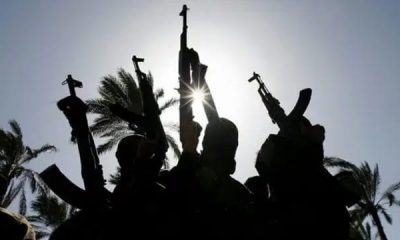
 News20 hours ago
News20 hours agoGunmen abduct two senior LG workers, three others
-

 News5 hours ago
News5 hours agoJust in: Senator Natasha tenders satirical ‘apology’ to Akpabio
-
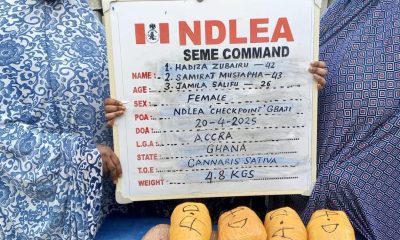
 News22 hours ago
News22 hours agoNDLEA storms Lagos hotel, recovers N1.042billion illicit drug consignments(Photos)
-

 News22 hours ago
News22 hours agoArmy Chief condemns beating, harassing civilians in military uniform says, it’s wrong
-

 News14 hours ago
News14 hours agoBenue LG chairman gives Fulanis 48hrs to leave all farmlands
-
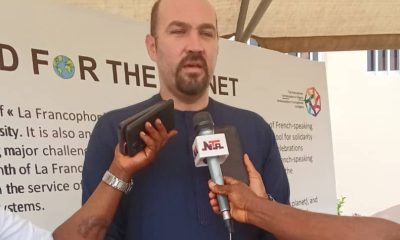
 News19 hours ago
News19 hours agoFrancophone Ambassadors, Nigeria Unite To Fight Against Climate Change
-
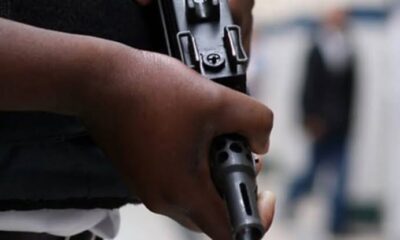
 News14 hours ago
News14 hours agoFive suspected kidnappers eliminated by police in Delta
-

 Metro7 hours ago
Metro7 hours ago‘My husband always makes love throughout the night until morning’ – Woman Wants Divorce





